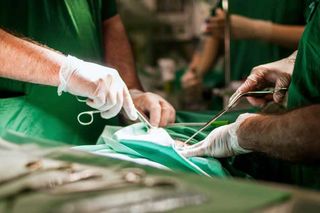
The Ethical Pitfalls of ‘Corrective’ Surgery for Intersex Babies
The standard of care needs to change.

Nature doesn’t follow arbitrary boundaries of male and female. It’s humans who have decided that certain genitalia are normal while others are ‘abnormal.’ And it’s humans who decide whether the latter should be classified as intersex. Intersex people constitute 1.7 percent of the population; 1 in 2,000 babies are born different enough for doctors to recommend they have surgery to make their bodies look more ‘normal.’ And unnerved parents make the choice to surgically alter intersex children’s genitalia not out of medical necessity, but out of discomfort and ignorance of alternatives. It’s a standard of care that activists say is unethical.
While biology textbooks paint a very black-and-white picture of the biological sexes, in reality, the way humans exhibit physical characteristics that are either ‘feminine’ or ‘masculine’ exists on a spectrum. Breasts, penises, clitorises, labia, and gonads all vary in size and shape. ‘Intersex’ is a generalized term used for various conditions in which a person is born with a reproductive system or sexual anatomy that doesn’t fit our cultural definition of female or male. This can mean that a person might be born with female-seeming genitals outside, but male anatomy inside (or vice versa); or born with genitals that seem a cross between male and female; or born with matching genitals and reproductive system, but with mosaic genetics where some cells have the XX (female) chromosome and others might have an XY (male).
*
Some intersex people can go their whole lives without knowing anything about them deviates from the accepted norm. Depending on what version of the condition they have, people could find out only when they reach puberty or later, when they’re found to be infertile; some may die without ever knowing they were intersex.
However, for newborns whose outward genitalia don’t appear to fit the norm, parents’ and doctors’ decision to assign them a gender is often taken hastily and out of fear, with no medical rationale relating to future health; children undergo unnecessary surgical procedures to ‘correct’ their anatomy before they’re able to consent to the decision. Boys with penises considered too small, or girls with clitorises or labia that doctors deem too big are operated on, their healthy tissue cut away for reasons that have no medical bearing on their health.
This practice, which intersex activists call Intersex Genital Mutilation (IGM), is purely concerned with surgically altering the child’s genitals for appearance’s sake. Apart from the risks of, say, vaginoplasty surgery being performed on an infant, intersex adults and advocacy groups argue that performing ‘corrective’ surgery to assign gender to intersex newborns robs them of their right to make an informed decision for themselves. Parents who consent on babies’ behalf are not always fully informed about the immediate and long-term risks of surgery, or the alternatives.
Related on The Swaddle:
More to Babies’ Sex Than X and Y Chromosomes, Researchers Say
The practice of genital-correcting surgery started in the 1950s, when a team of medical professionals at Johns Hopkins University developed what they called an “optimum gender of rearing” system for treating intersex children. It involved cosmetic genital surgery, as well as endocrinologists monitoring and manipulating patients’ hormone levels to ensure not necessarily their health, but their outward manifestation of the ‘correct’ gender. Doctors and families generally tried to conceal the truth, with medical textbooks even providing advice on how to lie to intersex patients when they’re older.
This model would go on to become a popular standard of care the world over,driven by a belief that children — later, adults — with gentalia that’s not quite ‘normal’ would suffer psychologically. Except, there is no actual evidence that intersex children who don’t get surgery suffer more psychologically than those who do get surgery. Many simply grow up with genitalia that looks a bit different. Arguably, the harm of having surgery as a newborn without being able to consent (or parents’ giving fully informed consent), simply to adhere to arbitrary standards for genital anatomy, and then being lied to about it, has far worse consequences for intersex individuals.
Related on The Swaddle:
Should Parents Be Able to Tinker With the Genome of Babies Before They’re Born?
Instead, the “optimum gender of rearing” model has dangerous health implications for intersex babies who undergo it. Many later suffer from heath problems at an early age because of unnecessary surgeries performed on them as infants. People who have undergone gonadectomies (removal of ovaries, testes, and/or ovotestes) and either haven’t been administered hormone therapy or had incompetent hormone therapy during childhood are at risk for severe osteoporosis and decreased libido. And since the practice involves doctors lying to and withholding records from patients, many intersex people suffer psychological harm and mistrust the medical system, which means they stop getting the medical care they need.
*
On 19 February of this year, Amnesty International published a report on the human rights violations faced by intersex children in Iceland, the challenges they face in accessing health care, and the lifelong consequences of unwanted genital surgeries. Assessing the progress of the intersex rights movement, Laura Carter, Amnesty’s researcher on sexual orientation and gender identity, said, “There have recently been some shifts in attitude, largely thanks to the tireless work of intersex activists, but a climate of misinformation and stigma means intersex people are still being harmed.”
Still, as the shroud of misinformation around intersex lifts, and intersex people begin to speak about their experiences, backlash grows against the commonness of gender assignment via surgery. Former surgeons general of the U.S. have co-written a paper stating categorically that these procedures are not necessary, and a 2017 report released by Human Rights Watch calls for an effective moratorium on “all surgical procedures that seek to alter the gonads or genitals of children with atypical sex characteristics too young to participate in the decision, when those procedures both carry a meaningful risk of harm and can be safely deferred.”
So, how should doctors approach this issue instead? For one, intersex children and parents should be treated in a stigma-free, supportive, and open way. Doctors should tell parents the truth — that intersex is fairly common; that there are no health benefits to be gained from surgery — and provide them with details about the condition, as well as their child’s medical records. Children can still be given a gender assignment as a boy or girl — which does not require surgery.
Rather than be counselled by surgeons and endocrinologists, parents should ideally have access to trained psychologists who can connect them to other parents of intersex children for support.
As the child grows, they should be given honest and accurate information about being intersex, as well as psychological counselling if needed. Researchers have found that peer support groups are the most helpful for children dealing with intersex issues. If an intersex person is interested in surgery, they should be ableto get it, but only after being fully informed of the consequences — and thus, able to consent.
Nadia Nooreyezdan is The Swaddle's culture editor. Since graduating from Columbia Journalism School, she spends her time thinking about aliens, cyborgs, and social justice sci-fi. She's also working on a memoir about her family's journey from Iran to India.
Related


The Scary Hallucinatory Condition Called Sleep Paralysis? I Love It
